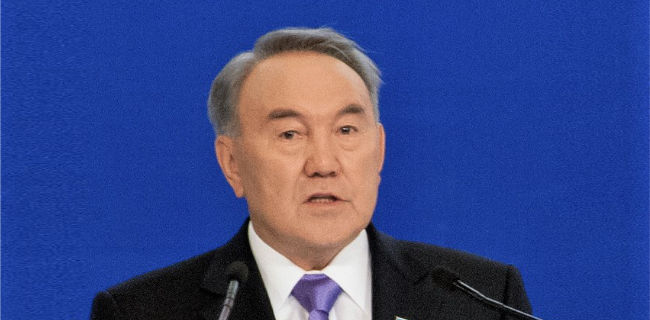Kazakhstan: The Legacy of President Nazarbayev
June 12, 2019 | Expert Insights

BACKGROUND
The Republic of Kazakhstan, is the world’s ninth largest country located in Central Asia with an area of 2,724,900 square kilometers. It was the last Republic to declare independence from the Soviet Union after its dissolution. Kazakhstan has a thriving oil and gas industry as well as vast mineral resources which make it an economic power in central Asia, generating around 60% of the region’s Gross Domestic Product (GDP).
Nursultan Nazarbayev became the first President of Kazakhstan when it gained independence in 1991, and has remained the nation’s president ever since. In 2015, Nazarbayev was elected for his 6th 5-year term as president but unexpectedly resigned in March, 2019. His resignation came as a surprise to many who expected him to run for president once again in the 2020 elections. While Nazarbayev did not specify the reasons for his sudden resignation, in a televised speech he announced, "I see my task now in facilitating the rise of a new generation of leaders who will continue the reforms that are under way in the country." Soon after Nazarbayev’s resignation, as per constitutional mandate, Speaker of the Senate Kassym-Jomart Tokayev assumed the role of interim President.
ANALYSIS
Despite being a constitutionally democratic nation, Human Rights Watch and several western nations (Including the US and the UK) have criticized President Nazarbayev and his government for being authoritarian. Reports suggest that Nazarbayev’s administration is responsible for various human rights violations including media censorship, repression of the opposition, harassment of human rights activists, arbitrary arrest, detention, and restrictive trade union registration requirements. Before his resignation in February, Nazarbayev fired his entire government stating that they failed to diversify Kazakhstan’s economy and improve the standards of living. The Kazakh president was under public scrutiny for the government’s inaction during a house fire that killed five little girls.
As the nation set out to cast its vote for the next Kazakh president, peaceful protests erupted at several locations across the country with larger demonstrations seen in the capital Nur Sultan and in Almaty. The protesters believed that the democratic exercise was simply an eyewash and that the snap election gave the ruling party candidate Tokayev an unfair advantage, with a Nazarbayev ally in the nation’s most powerful office. In response to these protests, Kazakh authorities arrested and detained over 500 individuals for participating in what they called “unsanctioned rallies”. People were reportedly being dragged onto buses by riot police and several journalists covering the protests were also detained. Kazakhstan is no stranger to police brutality. In 2011, at least 16 people died and another 18 were injured during clashes between the police and protesters.
Despite the widespread protests, Tokayev won by a landslide, receiving 70.96% of the vote while the opposition candidate Amirzhan Kosanov secured only 16.23%. There has not been a strong opposition candidate in Kazakh elections since 2005. The Central Election Commission (CEC) accredited 1,013 international observers, including 866 from nine international organizations and 147 from 41 foreign countries in an effort to ensure that the 2019 presidential election is free and fair. These observers report that the 2019 election met both national and international standards. According to the head of the Commonwealth of Independent States (CIS) observer mission, Sergei Lebedev, “The observers noted a few violations, which, according to the mission, could not affect the election results in their reports. The members of the mission observed the counting of votes and noted that it complied with constitutional law.” The Organization for Security and Co-operation in Europe, the region’s primary electoral monitoring body, has never recognized an election in Kazakhstan as free and fair. Its reports conclude that it could not “guarantee an honest vote.”
ASSESSMENT
It is our assessment that despite resigning from the presidency, Nursultan Nazarbayev will continue to exert his political influence in Kazakhstan as the leader of the Nur Utan Party and as the Chairman of the Security Council. Nazarbayev holds the title “Leader of the Nation” which grants him life-long immunity from persecution in Kazakhstan. Moreover, it seems as though Nazarbayev has been grooming Tokayev to succeed him. Even though the announcement of his resignation came unexpectedly, it wasn’t unplanned. Prior to his resignation, Nazarbayev reportedly made inquiries about the status of his power, should he decide to step down.
If Tokayev had been handpicked for leadership by Nazarbayev and Kazakh citizens are unhappy with the transition of power, there must definitely be some kind of vulnerability in the nation’s election process that takes away the people’s power to choose. The constitution of Kazakhstan allows for a very strong executive with limited checks. We believe that unless there are checks and balances implemented, successive presidents can continue to abuse their powers and run authoritarian regimes under the guise of democracy.
We think that Tokayev’s new role as president presents an opportunity for the leader to respond to the public and introduce much needed constitutional reform. If Tokayev is able to address the nation's human rights concerns, Kazakhstan stands to gain from improved diplomatic relations with Western nations.
We believe that the Kazakh economy is also affected by the decline in global oil prices and this has affected public spending, causing disquiet amongst its people.








Comments